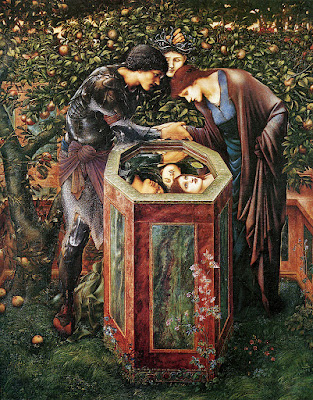NOTE: Browning's poetry is different from Keats, Coleridge, and Wordsworth, in that most of it is in a form called "Dramatic Monologues." As the title suggests, it's the speech of a single character (often a historical figure, or a character from literature or legend) talking to another person. So imagine this as a monologue from a play where the main character is talking to the audience. Like the paintings we look at on Wednesday, Browning is attempting to combine modern speech & character to mythic and historical situations. So it would be like the 'modern' look of Guenevere or Ophelia that we looked at in class. However, it's also like "The Baleful Head" (pictured above) where the historical/mythical setting is used as an allegory about issues of modern life. So try to imagine how he's attempting to talk about his own world through the lens of the past.
Poems: "The Last Duchess" and "Porphyria's Lover"
Answer TWO of the following:
Q1: Who is the narrator in "The Last Duchess" talking to? Or rather, why does he have guests in his palace? What clues does the poem offer...and how does it make his showing of the painting of his 'last duchess' quite ironic?
Q2: What does the narrator mean when he says, "She had a heart--how shall I say?--too soon made glad,/Too easily impressed" (2). Why is this a criticism of the duchess, and why does it ultimately lead to her doom?
Q3: The title "Porphyria's Lover" reminds us of the character of Porphyro, in the Eve of St. Agnes. While they're clearly not the same character, why might Browning have wanted to evoke that poem in this one? What connections come to mind as you read it?
Q4: What does the narrator mean when he exults, at the end of the poem, "That all it scorned at once is fled!/And I, its love, am gained instead!" (9). What has she "gained" in death...or what does the narrator think she's gained that she lacked in life?



No comments:
Post a Comment